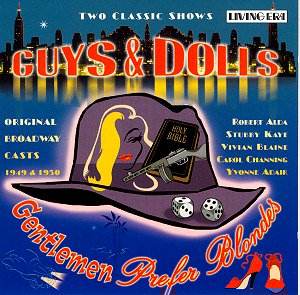 CD Reviews
CD Reviews MusicWeb
Webmaster: Len Mullenger
Len@musicweb.uk.net
[Jazz index][Purchase CDs][ Film MusicWeb][Classical MusicWeb][Gerard Hoffnung][MusicWeb Site Map]

Guys and Dolls, musical highlights (1950)
Robert Alda (tenor), Stubby Kaye (bar), Isabel Bigley (sop), Vivian Blaine (sop)
Chorus and Orchestra/Irving Actman
Rec. New York, 1950
Jule STYNE (1905-1994)
Gentlemen Prefer Blondes, musical highlights (1949)
Carol Channing (sop), Yvonne Adair (sop), Jack McCauley (ten), Eric Brotherson (bar)
Chorus and Orchestra/Milton Rosenstock
Rec. New York, 1949 Mono
Crotchet Mid price
These titles are rather better known than the contents of the shows themselves. They are amongst a number of original Broadway cast recordings that were released on Decca and Columbia 78 records during the opening runs and they sold well. The coming of the LP brought about their first transcription and again they were popular.
This CD release is taken from the original records by Peter Dempsey who has done an excellent job with the transcription and cancellation of surface noise.
Guys and Dolls is an old chestnut that needs no introduction. Of its numbers, the best known are 'Sit Down, You're Rocking the Boat' [tk.14], 'I've Never been in Love Before' [tk.9], 'Luck be a lady’ [tk.12], and 'Guys and Dolls' [tk.6].
Some of the singing here is strident when judged by operatic standards, but of course this is an American musical, a genre where emphasis on the right characterisation is of paramount importance. Robert Alda sings competently and with authority as the lead, Sky Masterson. Isabel Bigley (Sarah Brown) gives good support with good vocal range and timbre. The singers are well- suited to their roles and yet Vivian Blaine (as the comically frivolous Miss Adelaide) is rather piercing with her reedy voice. With experience of nightclub singing, her over-the-top shrill voice may well match her on-stage characterisation, but here is unwelcome. Pat Rooney (as Arvide) is an inexperienced singer who has a soft velvety tone yet tends to waver or crack on long-held notes.
Much energy is shown in creating this recording with the forwardly placed singers and clear diction. The musical direction is first class and the small orchestra respond well under the direction of Irving Actman.
Styne's Gentlemen Prefer Blondes does not enjoy as vivacious a score as the one written a year later by Loesser (above) and so I did not enjoy this musical to the same extent. There is no clear theme, the lyrics are particularly trivial (It's Delightful down in Chile), and much of the orchestration is simplistic. The chorus is small, but accurate in its close harmony singing [tk.23].
Although the recording is not as dry as Guys and Dolls there is a lack of clarity to the vocals, particularly in the chorus numbers.
This show is remembered principally for one number, 'Diamonds are a Girl's Best Friend'. This is sung by Carol Channing in character as the perkily common Lorelei. I would have preferred a smoother rendition in a softer, more sensual voice. We can however grasp her potential as a good singer at the beginning of 'A Little Girl from Little Rock' where she retains the comedy in delivery yet reveals a good voice. Jack McCauley is a confident lyrical singer who commands a strong presence and sounds well with the long drifting phrases of 'Bye, Bye, Baby' [tk.18]. He exudes all the confidence needed to overcome those dotty on-stage females. Yvonne Adair (as Dorothy) provides the calculated charm needed to match the engaging rhythm of the jazzed up number 'I Love what I am Doing' [tk.20]. Her stage partner Eric Brotherson (as Henry Brotherson) [was his name especially written into the part by Leo Robin, writer?] is very fitting with his mature handling of the role.
The orchestra is recessed at times with a noticeable drop in woodwind and mid frequencies: or is it more a limitation of the orchestration?
The artists in these recordings are those who made the stage performances famous. Both musicals were made into films by MGM in 1955 (Guys and Dolls) and 20th Century Fox in 1953 (Gentlemen prefer Blondes).
Raymond Walker